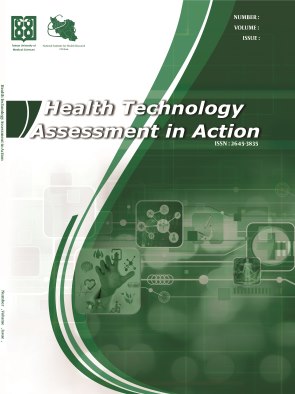Evaluation of Validity Indices of Spiritual Competence Questionnaire
Spiritual Competence Questionnaire
Abstract
Introduction: Spiritual competence in personal and work life increases compatibility, adaptation, problem solving skills, finding meaning in life events, inner and outer peace, dynamism and vitality and can have positive effects on other aspects of life. The first step to improve the status of spiritual competence in society is to evaluate it, which currently has few tools in Persian to measure it, so the purpose of this study is to translate and validate the Spiritual Competence Questionnaire.
Methods: After Persian translation, the formal validity of this questionnaire was inference using the opinions of nine experts based on Waltz and Basel and Lawshe's theory. Also, 179 people completed the research questionnaire to inference the reliability and perform exploratory factor analysis. Excel and SPSS24 software were used for statistical analysis.
Results: The validity of this questionnaire in two dimensions was 90% CVI = (simplicity of questions = 88%, relevance of questions = 96%, clarity of questions = 87%) and 97% CVR = standard. The reliability of this tool, which was calculated based on Cronbach's alpha test, was 89%. The KMO index in exploratory factor analysis was 88% and the mean-variance for seven factors was 67%.
Conclusion: In addition to proper reliability and validity, this tool; is quite simple and fluent. Also, with the ability to complete in 15 to 20 minutes, it has the necessary features to assess the spiritual worthiness of people in different age groups.
2. Baloochi A, Abazari F, Mirzaee M. The relationship between spiritual intelligence and aggression in medical science students in the southeast of Iran. International journal of adolescent medicine and health. 2018;32(3):47-63.
3. Kevern P. Spiritual care as a response to an exaptation: how evolutionary psychology informs the debate. Nursing Philosophy. 2017;18(2):121-139.
4. Awan S, Sitwat A. Workplace spirituality, self-esteem, and psychological well-being among mental health professionals. Pakistan Journal of Psychological Research. 2014;11(5):125-49.
5. Hodge DR. Spirituality: Towards a theoretical framework. Social Thought. 2000;19(4):1-20.
6. Sajadi M, Niazi N, Khosravi S, Yaghobi A, Rezaei M, Koenig HG. Effect of spiritual counseling on spiritual well-being in Iranian women with cancer: A randomized clinical trial. Complementary therapies in clinical practice. 2018;30(3):79-84.
7. Hodge DR. Spirituality and people with mental illness: Developing spiritual competency in assessment and intervention. Families in Society. 2004;85(1):36-44.
8. Oxhandler HK, Pargament KI. Measuring religious and spiritual competence across helping professions: Previous efforts and future directions. Spirituality in Clinical Practice. 2018;5(2):120-137.
9. Lu J, Li C, Potts CA, Ufomadu J. An exploration of variables that contribute to counseling students’ spiritual competence development: Implications for counselor education. International Journal for the Advancement of Counselling. 2019;9(2):1-17.
10. Hodge DR. Spiritual competence: What it is, why it is necessary, and how to develop it. Journal of Ethnic & Cultural Diversity in Social Work. 2018;27(2):124-39.
11. Frick E, Ziemer P, Heres S, Ableidinger K, Pfitzer F, Buessing A. Spiritual competence in psychiatry and psychotherapy-Barriers and success factors. Der Nervenarzt. 2021; 92(5):479-486.
12. Yurisa A. Correlation between Spiritual Competence and Self-Expression with Student Learning Behavior. Educare. 2019;12(1):69-76.
13. Dailey SF, Robertson LA, Gill CS. Spiritual competency scale: Further analysis. Measurement and Evaluation in Counseling and Development. 2015;48(1):15-29.
14. Amram J. Intelligence Beyond IQ: The contribution of emotional and spiritual intelligences to effective business leadership. Institute of transpersonal psychology. 2005:35-9.
15. Vaughan F. What is spiritual intelligence? Journal of humanistic psychology. 2002;42(2):16-33.
16. Bolhari J, Mohsenikabir M. Compiling and evaluating educational package of spiritual skills for university students. Iranian Journal of Psychiatry and Clinical Psychology. 2019;25(2):210-21.
17. Achour M, Nor MRM, MohdYusoff MYZ. Islamic personal religiosity as a moderator of job strain and employee’s well-being: The case of Malaysian academic and administrative staff. Journal of religion and health. 2016;55(4):1300-11.
18. Fluellen SJ. Development of the Spiritual and Religious Competency Assessment (SARCA): An instrument to measure competency in supervisees [PhD Dissertation]. Oklahoma State University, 2007.
19. Young JS, Cashwell C, Wiggins‐Frame M, Belaire C. Spiritual and religious competencies: A national survey of CACREP‐accredited programs. Counseling and Values. 2002;47(1):22-33.
20. Young JS, Wiggins‐Frame M, Cashwell CS. Spirituality and counselor competence: A national survey of American Counseling Association members. Journal of Counseling & Development. 2007;85(1):47-52.
21. Miller G. The development of the spiritual focus in counseling and counselor education. Journal of Counseling & Development. 1999;77(4):498-501.
22. Shuler MK, Durodoye BA. A review of integrating spirituality and religion into counseling: A guide to competent practice. Counseling and Values. 2007. 1;52(1):89-92.
23. Corey G, Corey MS, Callanan P. Issues and ethics in the helping professions: Wadsworth/Thomson Learning; 1988.
24. Hage SM. A closer look at the role of spirituality in psychology training programs. Professional Psychology: Research and Practice. 2006;37(3):303-324.
25. Sherkat M, Kalantari M, Azarbayejani M, Abedi MR. The effects of education on spiritual intelligence on students' psychological wellbeing, anxiety, depression, and spiritual intelligence. Journal of psychologicalscience. 2020;19(88):481-91. (Persian)
26. Hosseini M, Elias H, Krauss SE, Aishah S. A review study on spiritual intelligence, adolescence and spiritual intelligence, factors that may contribute to individual differences in spiritual intelligence and the related theories. Journal of social sciences. 2010;6(3):429-438.
27. Ross L, McSherry W, Giske T, van Leeuwen R, Schep-Akkerman A, Koslander T, et al. Nursing and midwifery students' perceptions of spirituality, spiritual care, and spiritual care competency: A prospective, longitudinal, correlational European study. Nurse education today. 2018;67:64-71.
| Files | ||
| Issue | Vol 5, No 1 (2021) | |
| Section | Articles | |
| DOI | https://doi.org/10.18502/htaa.v5i1.7384 | |
| Keywords | ||
| Spiritual competence Psychometrics Factor analysis | ||
| Rights and permissions | |

|
This work is licensed under a Creative Commons Attribution-NonCommercial 4.0 International License. |




